
Kvasny Prumysl
Scope & Guideline
Elevating Knowledge in Brewing Science and Technology.
Introduction
Aims and Scopes
- Barley and Malt Research:
The journal extensively covers the characterization, quality assessment, and genetic resources of barley and malt, including studies on historical vs. contemporary varieties and their impact on brewing quality. - Hop Variety Evaluation:
A significant focus is placed on the evaluation of hop varieties, including their agronomic traits, essential oil composition, and contributions to beer flavor profiles. - Microbiology in Brewing:
Research concerning the role of microorganisms in brewing processes is prominent, including yeast characterization, fermentation science, and the implications of microbial contamination. - Sensory and Chemical Analysis:
The journal publishes studies on the sensory attributes of beer and malt, as well as chemical analyses that explore the stability, degradation, and flavor profiles related to various brewing practices. - Innovative Brewing Technologies:
There is a consistent emphasis on technological advancements in brewing, including new methods for quality assessment, brewing equipment development, and sustainable practices in the industry.
Trending and Emerging
- Sustainability and Climate Adaptation:
Research on drought-tolerant hop genotypes and sustainable agricultural practices is gaining traction, highlighting the industry's response to climate change and the need for resilient crop varieties. - Microbiome and Fermentation Science:
There is an increasing emphasis on the characterization of brewing yeasts and their interactions, as well as studies on microbial consortia for fermentation, reflecting a deeper understanding of microbiology's role in brewing. - Consumer Preferences and Sensory Science:
An emerging focus on the sensory profile of beers and the impact of maturation time on flavor indicates a growing interest in consumer experience and product quality. - Innovative Brewing Techniques:
Recent publications have highlighted new brewing technologies and methods, including the use of recycled materials and improved fermentation processes, signaling an innovative approach within the brewing sector.
Declining or Waning
- Historical Brewing Practices:
Research focusing on traditional brewing methods and historical brewing practices has decreased, possibly as the industry moves towards modernization and innovation. - Non-Microbiological Turbidity Studies:
While earlier issues featured in-depth studies on non-microbiological turbidity in beer, this theme appears to have waned, suggesting a possible resolution of earlier concerns or a shift towards more pressing issues within brewing. - Brewing with Alternative Grains:
There has been a noticeable reduction in studies exploring the use of alternative grains and adjuncts in brewing, indicating a possible consolidation around barley as the primary grain for brewing.
Similar Journals
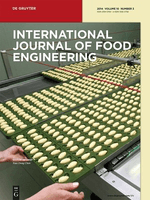
International Journal of Food Engineering
Elevating Food Systems with Cutting-Edge ResearchThe International Journal of Food Engineering, published by WALTER DE GRUYTER GMBH, serves as a pivotal platform for cutting-edge research in the field of food engineering. With an ISSN of 2194-5764 and an E-ISSN of 1556-3758, this journal focuses on innovative technologies, production processes, and quality control within food systems. Located in Germany, the journal has gained notable recognition, as reflected in its Scopus rankings, which place it within the 61st percentile in miscellaneous engineering and the 50th percentile in food science. Although it operates under a traditional access model, the journal's striking category quartiles signify its importance: achieving Q2 in Engineering and Q3 in both Biotechnology and Food Science in 2023. By fostering interdisciplinary research, the International Journal of Food Engineering aims to connect scientists, engineers, and industry professionals, ultimately contributing to advancements in food safety, sustainability, and nutrition. Join a vibrant community of experts driving innovation and addressing global food challenges through your contributions to this esteemed journal.
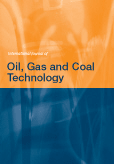
International Journal of Oil Gas and Coal Technology
Fueling Innovation in Energy ResearchWelcome to the International Journal of Oil Gas and Coal Technology, a key platform for research and innovation in the energy sector, published by INDERSCIENCE ENTERPRISES LTD. With an ISSN of 1753-3309 and an E-ISSN of 1753-3317, this journal has been serving the academic community since its inception in 2008, continuing through to 2024. Located in the heart of Geneva, Switzerland, this journal focuses on the essential fields of oil, gas, and coal technologies, addressing cutting-edge developments and challenges in energy production and sustainability. Although currently categorized in the fourth quartile in Energy (Miscellaneous) and holding a Scopus rank in the 26th percentile, the journal aims to enhance its visibility and impact through rigorous peer-reviewed research articles, critical reviews, and insightful case studies that are accessible to the global academic community. Researchers, professionals, and students alike will find valuable insights and advancements in energy technology that contribute to a sustainable future.

OCL-Oilseeds and Fats Crops and Lipids
Elevating Standards in Agronomy and BiochemistryOCL-Oilseeds and Fats Crops and Lipids is a renowned open-access journal published by EDP Sciences S A, specializing in the fields of agronomy, food science, and biochemistry. Since its inception in 2000, this journal has vigorously contributed to the advancement of research surrounding oilseeds and fats, addressing critical issues related to crop production, lipid analysis, and sustainable practices in food science. With an impressive impact factor reflected in its 2023 rankings—Q2 in Agronomy and Crop Science, Q3 in Biochemistry, and Q2 in Food Science—OCL stands out for its rigorous peer-review process and commitment to disseminating high-quality research. Its Scopus rankings further establish its reputation within the scientific community, occupying the 73rd and 64th percentiles in Agronomy and Food Science, respectively. This makes it an essential platform for researchers, professionals, and students focused on enhancing the understanding and application of lipid science and oilseed cultivation. Located in France, OCL encourages a global dialogue on innovations and discoveries that can drive the future of agricultural production and food technology.
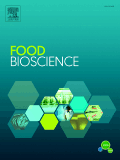
Food Bioscience
Bridging Disciplines to Transform Global Food SystemsFood Bioscience is a leading peer-reviewed journal published by Elsevier, dedicated to advancing the understanding of the complex interplay between food science and biosciences. With an impressive Impact Factor that places it in the Q1 and Q2 quartiles for Food Science and Biochemistry respectively, the journal consistently ranks among the top publications in its field, reflected in its Scopus rankings (Rank #83/389 in Food Science and Rank #175/438 in Biochemistry). Since its inception in 2013, Food Bioscience has fostered a multidisciplinary approach, bridging gaps between research in agricultural, biological, and food sciences, thus encouraging innovative solutions to the pressing challenges facing the global food supply chain. Although it currently operates under a subscription model, the journal is committed to disseminating high-quality research, making significant contributions to both academic scholarship and industry practices. Researchers, professionals, and students alike are invited to explore the wealth of knowledge contained within its pages as it plays a pivotal role in shaping the future of food bioscience.
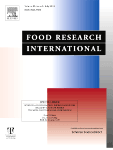
FOOD RESEARCH INTERNATIONAL
Empowering the Global Food Science CommunityFOOD RESEARCH INTERNATIONAL is a premier academic journal published by ELSEVIER, specializing in the field of Food Science. With an impressive impact factor and ranked Q1 in the 2023 category quartiles, it stands at the forefront of research, positioned 17th out of 389 in the Scopus ranking for Agricultural and Biological Sciences, attaining a commendable 95th percentile. The journal publishes high-quality, peer-reviewed articles that cover a broad spectrum of topics, including food safety, quality control, nutrition, and biotechnology, making it an invaluable resource for academics, industry professionals, and students alike. As FOOD RESEARCH INTERNATIONAL seeks to enhance understanding and advance technologies related to food, it encourages innovative perspectives and interdisciplinary research. The journal, active from 1992 and continuing through 2024, is an essential platform for disseminating vital findings and fostering collaboration within the global food science community.
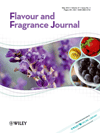
FLAVOUR AND FRAGRANCE JOURNAL
Enhancing Palates and Scents Through ScholarshipThe FLAVOUR AND FRAGRANCE JOURNAL, published by WILEY, is a prestigious academic periodical dedicated to the interdisciplinary study of flavour and fragrance chemistry. With a commendable impact factor and ranked Q2 in both the Chemistry (miscellaneous) and Food Science categories, this journal plays a pivotal role in disseminating innovative research that enhances our understanding of sensorial experiences. Established in 1985, it continues to serve as a vital platform for scientists, industry professionals, and scholars who are engaged in the exploration of aromas and flavours, thereby fostering advancements in food science, sensory analysis, and product development. Although it is not an open-access journal, the high visibility and notable contributions reflect its significant standing in the academic community, encouraging discourse and collaboration among its readership. Researchers and students alike will find invaluable insights and cutting-edge studies that push the boundaries of flavour and fragrance research within its pages.
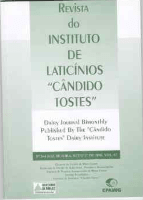
Journal of Candido Tostes Dairy Institute
Advancing Dairy Science for a Sustainable FutureJournal of Candido Tostes Dairy Institute, published by the prestigious INST LATICINIOS CANDIDO TOSTES, has established itself as a vital resource in the field of dairy science and technology. This Open Access journal, operating since 2008, provides an inclusive platform for researchers, professionals, and students to share groundbreaking findings and innovative practices related to dairy production, processing, and quality. Located in Brazil, this journal aims to advance knowledge and standards within the dairy industry, ensuring global access to high-quality, peer-reviewed research. The journal not only contributes to the scientific community but also supports practical advancements that benefit dairy producers and consumers globally. By fostering collaboration among scholars and practitioners, the Journal of Candido Tostes Dairy Institute plays a crucial role in shaping the future of dairy sciences. We encourage contributions that explore novel aspects of dairy research, thereby bridging theoretical insights with industry applications.
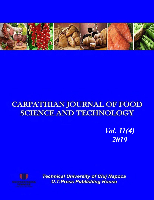
Carpathian Journal of Food Science and Technology
Fostering a Global Dialogue on Contemporary Food IssuesCarpathian Journal of Food Science and Technology, a distinguished publication from the NORTH UNIV CENTER BAIA MARE, has been a pivotal platform for disseminating groundbreaking research in the field of food science since its inception in 2009. With an ISSN of 2066-6845 and an E-ISSN of 2344-5459, this Open Access journal aims to promote knowledge and innovation, offering unrestricted access to its content, thereby enhancing visibility for authors and facilitating a wider readership. Based in Romania, the journal plays a crucial role in advancing scientific inquiry within the agricultural and biological sciences, particularly focusing on contemporary food science issues. As it continues its convergence through 2024, the journal currently holds a Q4 ranking in the Food Science category, allowing it to carve out a unique niche within the academic community despite its current Scopus percentile ranking of 19th. Scholars, researchers, and students in the field will find the journal an invaluable resource for the latest advancements and discussions, making it an essential addition to their academic pursuits.
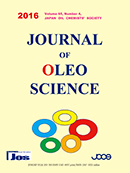
Journal of Oleo Science
Championing Diverse Perspectives in Oleochemical ResearchJournal of Oleo Science, published by the Japan Oil Chemists Society, stands as a pivotal resource in the domains of chemical engineering, chemistry, and medicinal applications, with a robust commitment to advancing knowledge in oleochemical research and technology. With an ISSN of 1345-8957 and an E-ISSN of 1347-3352, this open-access journal has been accessible to a global audience since 2021, facilitating the dissemination of high-quality scholarly articles and fostering collaboration among researchers. The journal, which has converged its publication scope from 2001 to 2024, currently holds a respectable Q3 ranking across multiple categories, reflecting its impact in the academic sphere. With Scopus ranks highlighting its position in general chemistry and chemical engineering, the Journal of Oleo Science not only serves as an essential platform for the latest developments in oleo science but also encourages the exploration of innovative approaches to tackling industry challenges. Articles submitted to the journal are subjected to rigorous peer review, ensuring that only the most significant and scholarly work is presented. By championing diverse perspectives and research findings, this journal is an invaluable asset for students, professionals, and academics dedicated to advancing the fields of oleochemistry and beyond.

FISHERY TECHNOLOGY
Empowering global discourse on marine resource utilization.FISHERY TECHNOLOGY is a distinguished journal dedicated to the advancement of knowledge in the field of fisheries science and technology. Published by the Society of Fisheries Technologists, India, this journal serves as a vital platform for researchers, professionals, and students across the globe to disseminate innovative findings and methodologies related to fishery practices, aquatic ecosystem management, and sustainable fishing technologies. With its ISSN 0015-3001, FISHERY TECHNOLOGY seeks to uphold the standards of scholarly research and contributes significantly to the discourse surrounding marine resources and their sustainable utilization. Although currently not available in an open-access format, the journal remains committed to reaching a wide audience through reputable distribution channels. The journal is characterized by its goal to bridge theoretical research with practical applications, thereby impacting both the scientific community and the fishing industry. Engage with FISHERY TECHNOLOGY to keep abreast of the latest developments and contribute to the sustainable management of aquatic resources.